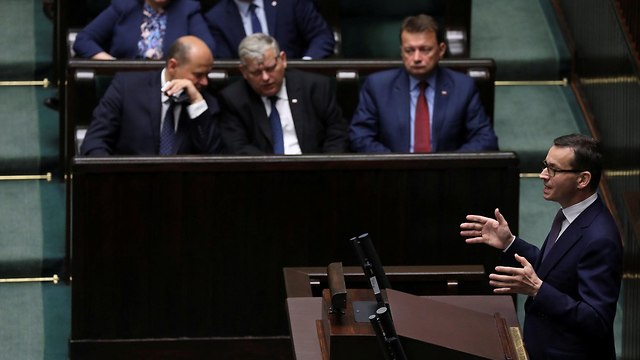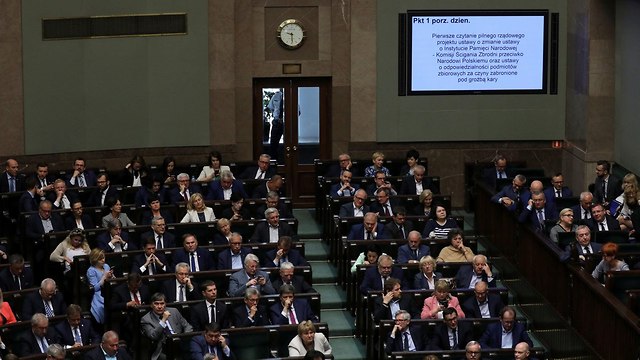Op-ed: To get the Poles to remove the criminal element from their controversial Holocaust law, Netanyahu had to pay a price, signing off on a joint statement minimizing Polish role in the Holocaust, but such a price is sometimes necessary to serve Israel’s bigger picture interests.
When Netanyahu is right, he’s right. The agreement he reached with the Polish government removed the criminal aspect from the law against attributing responsibility to the Polish people for the Nazis’ crimes during World War II. The law remains a declarative one, with no practical meaning.
Netanyahu had to pay a price for the Polish withdrawal: He agreed to issue a joint statement with Poland’s Prime Minister Mateusz Morawiecki which dwarfs the Poles’ role in the horrors of the Holocaust.
Sever Plocker, who wrote a comprehensive article about the joint statement this week in Yedioth Ahronoth, came out against parts of it. “It is controversial, distorted and outrageous,” he wrote.

I agree with every word. The statement is fake history. But even so…
Prime ministers are not historians. When David Ben-Gurion talked about the “other Germany,” he had no authority to give German a stamp of approval only a few years after the Holocaust. He saw before him an Israeli interest—an economic and security interest—and made it a top priority. Israel desperately needed aid from Germany, and its prime minister was willing to pay the price. There were those who cursed him for this; others blessed him. In hindsight, it seems like he was right.
In Israel’s relations with foreign governments, there are principles and there are interests. The principle, if we can use an example from the margins of the news, says that the Eurovision must be held in Jerusalem, Israel’s capital. We must not desecrate the Shabbat for it, not in Jerusalem, and we must not be deterred from splitting the Israel Public Broadcasting Corporation, just as the government had decided.

However, the interest is to have the Eurovision in Israel: It’s good for tourism, it’s good for public relations, it’s good for the voters. If the price is to forego having it in Jerusalem, we’ll forego having it in Jerusalem; if the desecration of the Shabbat is required, we’ll desecrate the Shabbat; if we need to postpone the IPBC’s split, we’ll postpone it. Netanyahu understands this. Regev didn’t, and she suffered for it. Regev is an expert in small scandals, she can’t see the bigger picture. A lot of headlines, zero influence. In the end, she’ll be relegated to a lower league.
The relationship with Poland is a more complex matter. The past is difficult. The current Polish government is not making it any easier. Its attitude towards history is bordering on Holocaust denial; its roots are anti-Semitic; its policies are nationalistic, anti-democratic, and plagued with xenophobia.
Israel had an interest to uproot the law that turned telling the truth about the Holocaust into a criminal offense. It also has security interests in Poland. Principles vs. interests. We just need to hope Netanyahu doesn’t believe the statement he signed.
The question of what the Poles did during the Holocaust will not be determined with a statement made by prime ministers. Prime ministers come and go. The historical truth will forever stand.
As reported by Ynetnews
